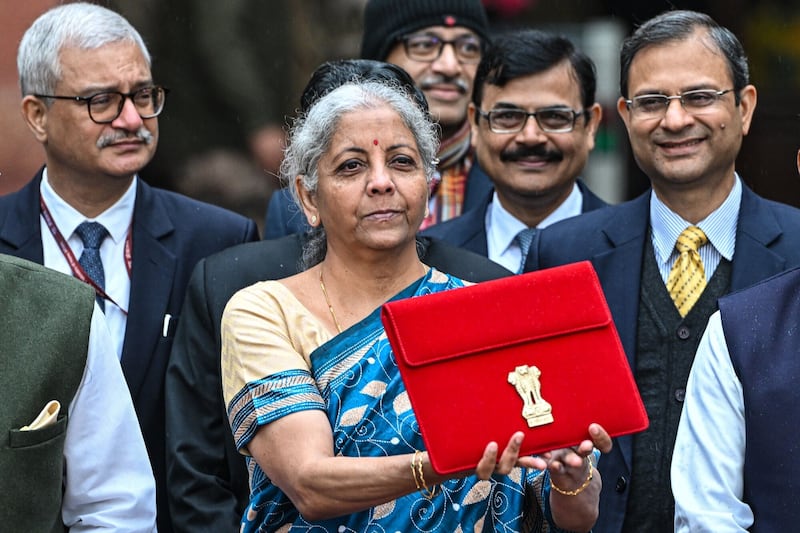Indian Prime Minister Narendra Modi's government has unveiled its last budget before the general election, due to be held by May.
The government took the opportunity to highlight its achievements in an attempt to win over voters, outlining its aim to focus on the poor, farmers, the youth and women.
It also had an eye on keeping its fiscal deficit in check, which limited its spending capacity.

“The impact of all-round development is discernible in all sectors,” Finance Minister Nirmala Sitharaman told the parliament on Thursday, during her budget presentation.
“There is macroeconomic stability. Investments are robust. The economy is doing well.”
The fiscal deficit estimate for the April 2024 to March 2025 financial year has been set at 5.1 per cent of the gross domestic product, down from an estimated 5.8 per cent in the current financial year.
"In an election year, the budget adeptly strikes a balance, prioritising sensibility over populism,” said Trideep Bhattacharya, president and chief investment officer, equities, at Edelweiss MF.
“It showcases India's unwavering commitment to infrastructure development, coupled with a steadfast adherence to fiscal prudence. This paves the way for sustained growth.”
Ms Sitharaman announced that capital expenditure would be increased by 11.1 per cent to 11.11 trilllion rupees ($133.9 billion).
However, a budget document showed that India would spend 4.55 trillion rupees ($54.84 billion) on food, fertiliser and rural employment subsidies in the next financial year, which is 7 per cent lower than the current financial year.
She said that the next five years would produce “unprecedented development” and that the government would build “20 million more houses” for poor people over that period.
Gross market borrowing was set at a lower-than-expected 14.13 trillion rupees.
India is also planning more measures to improve energy security, Ms Sitharaman said.
Thursday's budget is an interim one, preceding a general election. The country's final budget will only be presented after the election results come through.

Because of this, business leaders were not anticipating any major policy shifts or “big bang” announcements in this budget.
No major changes were made to the taxation regime, for instance.
Infrastructure spending has been a key area of focus for the government, as it aims to boost the economy and create much-needed jobs.
“While inflation has been a concern globally, the finance minister's focus on staying on the path of fiscal prudence in the interim budget will surely be an enabler for a stable interest-rate scenario in the economy and bodes well for the overall financial sector,” said George Alexander Muthoot, managing director of Muthoot Finance.
Some experts have noted that the government is already confident about its economic achievements, and recent successes in state elections have also boosted its confidence as Mr Modi bids for a third term.
India's economy grew by 7.6 per cent in the third quarter of last year, according to official data, making it one of the world's fastest-growing economies.
Although expectations were muted, there was still some disappointment.
"What is a bit of a dampener is lack of any big push for consumption," said Motilal Oswal, managing director and chief executive, Motilal Oswal Financial Services.
"Consumption has been weak, especially in rural India, as indicated by corporate earnings for the last few quarters. The budget doesn’t provide any near-term solution for quick revival for consumption."
Keeping the fiscal deficit under control is particularly important for India as it aims to attract more foreign investment flows, say economists.
“Fiscal consolidation is also equally important, given that there is bond inclusion coming up, and globally India is looked at as an engine for macro stability,” said Anitha Rangan, economist at Equirus, a Mumbai-based financial services firm.
“Now what that means is that there is not so much available room for spending.”
JP Morgan plans to include India's government bonds in its emerging markets index from June 28, which is expected to be a pivotal moment.
“This is a very good budget for the bond market as the government chose fiscal prudence over populist spending,” said Pankaj Pathak, fund manager, fixed income, Quantum AMC.
“The budgeted fiscal deficit of 5.1 per cent of GDP is lower than even the lowest of market estimates. Faster fiscal consolidation and consequent decline in the government’s market borrowing should drive bond yields lower and bond prices higher.”
Ms Sitharaman tried to appeal to voters during her budget presentation by recounting India's economic achievements and the help that the government has given to farmers.
“We believe in empowering the poor,” she said. She also reaffirmed the government's aim for India to become a developed country by 2047.






